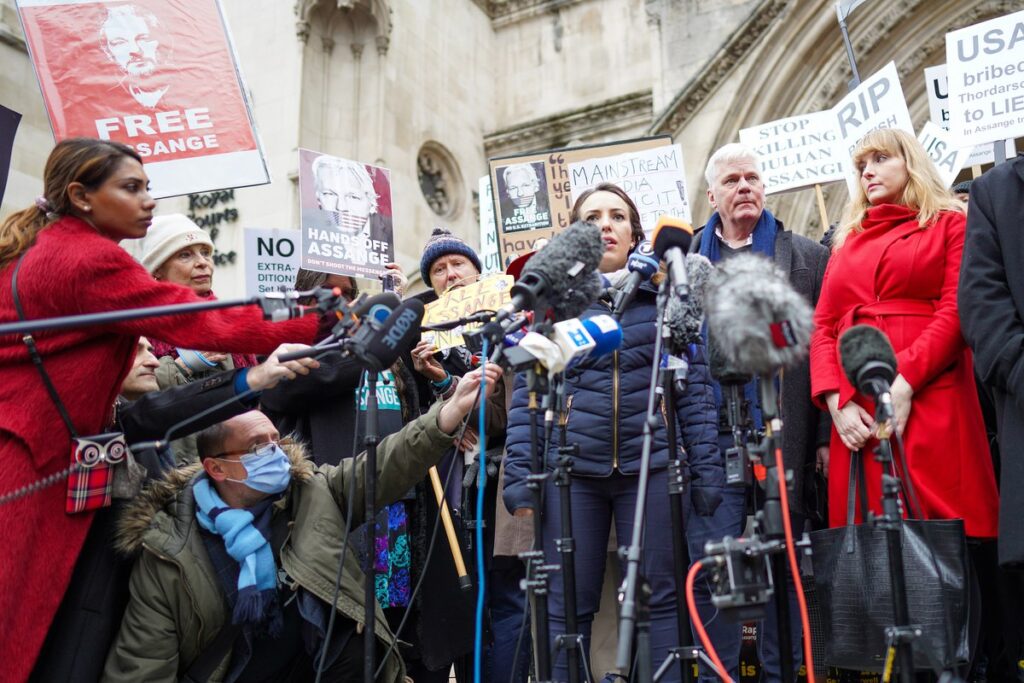Julian Assange Extradition Case: The Criminalisation of Journalism
By Amber Hamed, BA Politics and International Relations

Photo Caption: (Stella Morris speaks on the appeal ruling)(Credit: Alisdare Hickson CC BY-SA 4.0)
Julian Assange, an Australian journalist based in the UK and founder of Wikileaks, has been held in Belmarsh Prison, a high-security prison in London, since 2019. He is currently facing an extradition case to the US where he could face a prison sentence or the death penalty.
A series of classified documents were published through Wikileaks with information disclosed by US Army intelligence analyst Chelsea Manning in 2010. Wikileaks has exposed a number of US war crimes from unlawful detention practised on prisoners in Guantanamo Bay, systematic torture and abuse of detainees in Iraq under US occupation, and countless cases of human rights violations. This included footage that showed indiscriminate targeting of Iraqi journalists and civilians from a US military helicopter.
Most recently, on February 21, protestors gathered outside the Royal Courts of Justice in London demanding Assange’s release and a stop to his extradition in light of his appeal hearing. Assange’s lawyers appealed, first, against the 2021 ruling where he was charged with being a ‘spy’ and ‘hacker’, and second, against the approval of extradition by the former home secretary, Priti Patel. The chant “Free Free Julian Assange” was heard as speakers and protestors gathered outside protesting his imprisonment and potential extradition. Among the speakers were Assange’s wife, Stella Assange, former Labour Party leader, Jeremey Corbyn, Zarah Sultana, Clare Daly and several other activists showing their solidarity with Assange.
“We know that what is at stake here is not only the life of a man, but more than that it is the defence of freedom of speech, freedom of association and against the criminalization of Journalism.”
Daly, a member of the European Parliament stated, “We know that what is at stake here is not only the life of a man, but more than that it is the defence of freedom of speech, freedom of association and against the criminalization of Journalism.” In her show of solidarity with Assange and “those who believe in the power of journalism,” Zarah Sultana, Labour MP for Coventry South, stated that “revealing war crimes is not a crime, it is journalism…Julian is being targeted for exposing US war crimes, the crimes of Empire and abuses of state power.”
Assange has been facing a possible extradition to the US since 2019 when his asylum in the Ecuadorian embassy in London was withdrawn following disputes with Ecuadorian authorities. He was then transferred to HM Belmarsh prison in London. In December 2021 the High Courts of Justice ruled that Assange may be extradited to the US. The US has built their case against Assange through indictments of conspiracy to commit computer intrusion and charges of 17 counts under the 1917 Espionage Act. If extradited to the US, he could face up to 175 years in prison and would face Special Administrative Measures (SAMs), which consist of harsh conditions including solitary confinement; a method that UN experts have previously stated is a form of psychological torture.
Many fear that Assange will be prosecuted under US law, without the protection of US law. Being tried under the Espionage Act while not receiving any First Amendment protections. There is fear that if Assange is extradited from the UK to the US for prosecution, it would set a dangerous precedent that journalists around the world could also face prosecution by the US. Many activists have argued that what Assange is being punished for is not hacking or spying, but rather is a political prosecution and punishment for whistleblowing. Irene Khan, the UN Special Rapporteur on freedom of expression expressed her concerns over the case stating that “it would set a dangerous precedent that could have a chilling effect on investigative journalism in the US and possibly elsewhere in the world.”
The Espionage Act is an antiquated piece of legislation that was never intended to apply to journalists and publishers. Assange’s lawyer, Jen Robinson discusses the context of the Espionage Act and how “it was produced during the context of the First World War to criminalise espionage, not journalism.” Robinson has also outlined in their extradition appeal that nothing is preventing the US from bringing new charges against him, including the risk of Assange facing the death penalty.
As Assange faces his appeal in the Royal Courts of Justice, activists continue to protest against this unjust attack against Assange, journalism, and freedom of speech.

